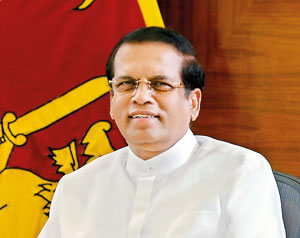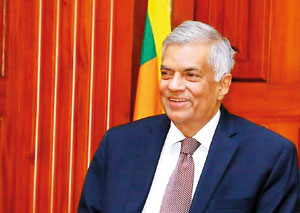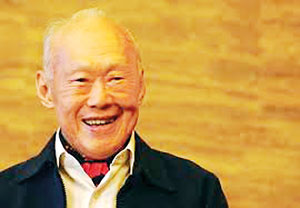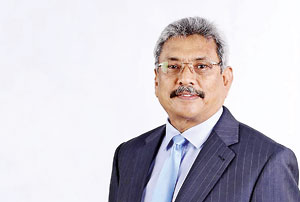Sunday Times 2
Does Lanka need military or spiritual discipline?

Maithripala Sirisena: Narcotics-free discipline
What’s happening? Whither Lanka? These are daily questions Sri Lankans ask one another but fail to provide a positive answer.
Nations do, at times, find themselves tottering on the brink of chaos, but try to avoid falling in by doing something right at the last moment. We, Sri Lankans, however, are in a jolly mood and appear to let the fun and frolics go on till the end of the year when a presidential election will come. There is a super- optimistic hope entertained for some time by most Sri Lankans that out of the chaos that prevails before an election, there will emerge their new leader who can take the country back to those glorious days that we are told existed once upon a time.
But even after the installation of an old or a new political Messiah in December this year, can we hope for a new kingdom to come by? What are the realistic plans of the Maithripala SLFP, the UNP or the Pohottuwa comrades? So far they have not been able to choose even their leaders!

Ranil Wickremesinghe: Lichchuvi discipline
But don’t worry, we are assured by all: We have the plans and a new era will dawn on Sri Lanka once our man wins.
This is certainly not encouraging for a septuagenarian who has been assured of so many fake dawns . Stretched out in our ‘hansiputuwa’, we did cast away from our minds the daily mudslinging and attempt to detect any emerging political thinking off the beaten track.
We observed that after our legislators’ performances in the supreme legislature, taking Sri Lankan politics to its lowest ever depths, there appears to be an emerging realisation of the need for enforcement of discipline on all fronts of governance.
Speaking recently on the need for discipline in Sri Lankan society during the Yovunpura sessions at Weerawila, Prime Minister Ranil Wickremesinghe said: A country needs disciplined people, economic development and social justice, if it is to be properly developed. If one section fails, the nation will not develop, he asserted pointing out that Singapore had developed as a result of military training.

Lee Kuan Yew: Singapore- style discipline
There will be no disagreement with the contention that Sri Lanka needs to be a disciplined nation, but his call for military training and if Wickremesinghe is suggesting that we follow the Singapore example, he will have many supporters as well as objectors. Whether it was military training of its citizens and/or the authoritarian governance of its founder Lee Kuwan Yu that made Singapore what it is today is moot point. Wickremesinghe’s forte has been the protection and building of democracy not militarism. Nonetheless if chaos, violence and the breakdown of law and order are not ended and discipline enforced soon, Lanka is in grave peril. Wickremesinghe’s singular achievement has been defeating a corrupt, authoritarian and undemocratic regime through democratic means, although his choice of leader and what followed will go down as one of the most outstanding comedies in political history.
Wickremesinghe on defeating the Rajapaksa regime spoke of how he intended to follow the Lichchuvi approach to governance. Lichchuvi existed around 6 BC in an area now known as Bihar. It is said to have been a republican system of governance where all parties worked together in a common assembly. What happened to the parties that Wickremesinghe brought together in the first quarter of the 21st Century is now history. The Republic of Lichchuvi was fortunate enough not to have howling mobs of monks, doctors, students and hoi polloi trade unionists marching on the streets of the capital almost every day demanding what they wanted and opposing anything they didn’t want.
What kind of discipline does Ranil Wickremesinghe want? Military discipline of the Singaporeans or the mental discipline that was practised then and now by Buddhists? Mental discipline is a product of rationality and military discipline is a product enforced and created by military strongmen which they can call upon when required.

Gotabaya Rajapaksa: Military discipline
Another school of disciplined governance has been promoted since last year under the inspiration of a Wannabe president, Gotabaya Rajapaksa.
Gota, as he is popularly known, served for 20 years in the Sri Lankan Army, retired as Lt.Colonel, while the war against LTTE terrorism was continuing, and migrated to the US,
He became an American citizen and settled down in Los Angeles, the City of Angels. On his brother Mahinda being elected president, he returned to Sri Lanka and served as the Secretary of Defence and later also as Secretary to the Urban Development Ministry. He has thrown the hat into the ring for the presidential election of 2019 and intends contesting it on the Pohottuwa ticket of the main opposition party of which his brother Mahinda is the de facto leader.
He is the force behind the ‘think tanks’ such as Viyath Maga that emerged last year and is backing him as presidential candidate.
Gota, too, is calling for enforcement of discipline in Sri Lanka. Being an ex-military man, it is likely that he is calling for military discipline and not mental or spiritual discipline. The problem with Gota is that he associated by his Opposition as the person behind the rigid authoritarian Rajapaksa regime.
On the other hand, he is being charged in the local courts with the violation of the laws of the land and now cases are being filed in American courts by former Sri Lankans for violating laws on human rights.
Meanwhile, President Maithripala Sirisena has changed almost overnight from a docile peaceful provincial politician to a gung-ho disciplinarian wanting to execute condemned drug barons who are alleged to be conducting international narcotics smuggling while being confined to high security cells in Welikada Prison. Maithripala has been repeating this threat of recalling the hangman so frequently that some people are wondering whether Maithri (Loving Kindness) as the name suggests, can make the quantum leap of hanging humans after decades of it being suspended. Nonetheless, it has political implications, with Western nations threatening to impose economic sanctions such as suspension of GSP which will be another heavyweight for his present bete noire and prime minister Wickremesinghe to carry.
Amidst these calls for restoration of discipline, Sri Lanka is doing quite an inexplicable somersault: suspending corporeal punishment in schools. For generations, discipline has been maintained in this country by those stern wielders of the cane who delivered six or more of the stinging best on the tender behinds of young scamps who dared violate school rules. It left welts of blue and black for weeks and the recipients, even after half a century or more, remember the consequences of breaking the law or school rules. However, things have turned topsy-turvy and now the successors to former disciplinarians – teachers and principals — today are the accused and are at the receiving end for violating the human rights of the little darlings who are playing merry-hell on the roads in their fathers vehicles or in night clubs.
Meanwhile, teachers are summoned not only before courts, but before political thugs in the form of chief ministers or nincompoops that have been appointed to grandiose state offices for no valid reason.
How can all these nonsensical things happen? Of course they do. We are said to be inhabitants of the Land of the Lotus Eaters discovered by Odysseus.

